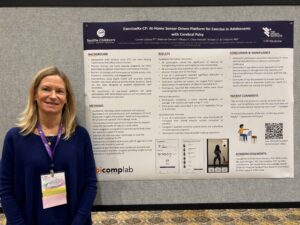ExerciseRx Supports Adolescents with Cerebral Palsy in Being Physically Active

This past November 2024, Connie Leibow, MPT, PCS, pediatric physical therapist at Seattle Children’s Hospital presented a scientific poster at the Acadamy of Pediatric Physical Therapy Annual Conference (APTA), on behalf of The Sports Institute’s ExerciseRx team. APTA brings together pediatric physical therapist nationally to share the latest research, innovative clinical practices, and advancements in the field. She presented a pilot research study supported by the Seattle Children’s Hospital Cerebral Palsy Research Committee that examined how ExerciseRx, The Sports Institute’s digital platform for personalizing home exercises, can support adolescents with cerebral palsy (CP) in home exercise programs.
Leibow shared, “After decades of caring for adolescents with disabilities as a therapist, I have not found a digital tool that was easy to use and provided improved accountability for a home exercise program. I continued to use paper handouts for home exercise programs. Using ExerciseRx to support home-based physical therapy for adolescents with CP has been eye-opening and transformative. ExerciseRx extends my ability to provide continuous exercise guidance and accountability between our in-person therapy sessions.”
Adolescents with CP often face lifelong motor impairments that impact their physical function. Physical therapy and home exercise programs are often prescribed to address impairments and improve function and participation. There are often barriers to therapy and home programs which may include: access, cost, insurance, motivation, and engagement. This study aimed to address these challenges by assessing the feasibility and usability of ExerciseRx, providing an innovative way for adolescents to engage with exercise on their own time and in their own environment.
“Digital technologies have the potential to change the way physical therapists support home-based physical therapy, transforming rehabilitation from a solitary journey into a more dynamic, connected experience where patients are empowered to take an active role in their physical function without facing barriers associated with in-person clinic visits,” says Leibow.
The study involved qualitative interviews with both adolescents with CP as well as pediatric physical therapists to understand their needs and expectations for an exercise app. Participants used the ExerciseRx app for a 5-week period in this study with a physical therapist customizing the programs to fit individual needs.
The ability of the app to track repetitions, sets, and exercise type in real time is the game changer compared to currently available digital exercise platforms. These aspects improved accountability as well as adherence.
Cindy Lin, MD, Clinical Professor of Sports & Spine Medicine and The Sports Institute’s Director of Clinical Innovation is a co-founder of ExerciseRx and co-PI on this study. “As a clinician, many patients struggle to be physically active and want more support and guidance from their healthcare team on what exercises are safe and beneficial for their personal health status. ExerciseRx bridges physical activity for the healthcare team and patients in the community, providing that missing piece of personalized and caring support around being more activity while not overburdening the provider with data overload,” shared Lin.
ExerciseRx was created by The Sports Institute in collaboration with the UW Ubicomp Lab in the Paul G. Allen School of Computer Science & Engineering and UW Human Centered Design and Engineering. This study was funded by the Seattle Children’s Research Institute’s Cerebral Palsy Research Committee.
If you are interested in learning more about ExerciseRx, please reach out to us at ExerciseRx@uw.edu.

